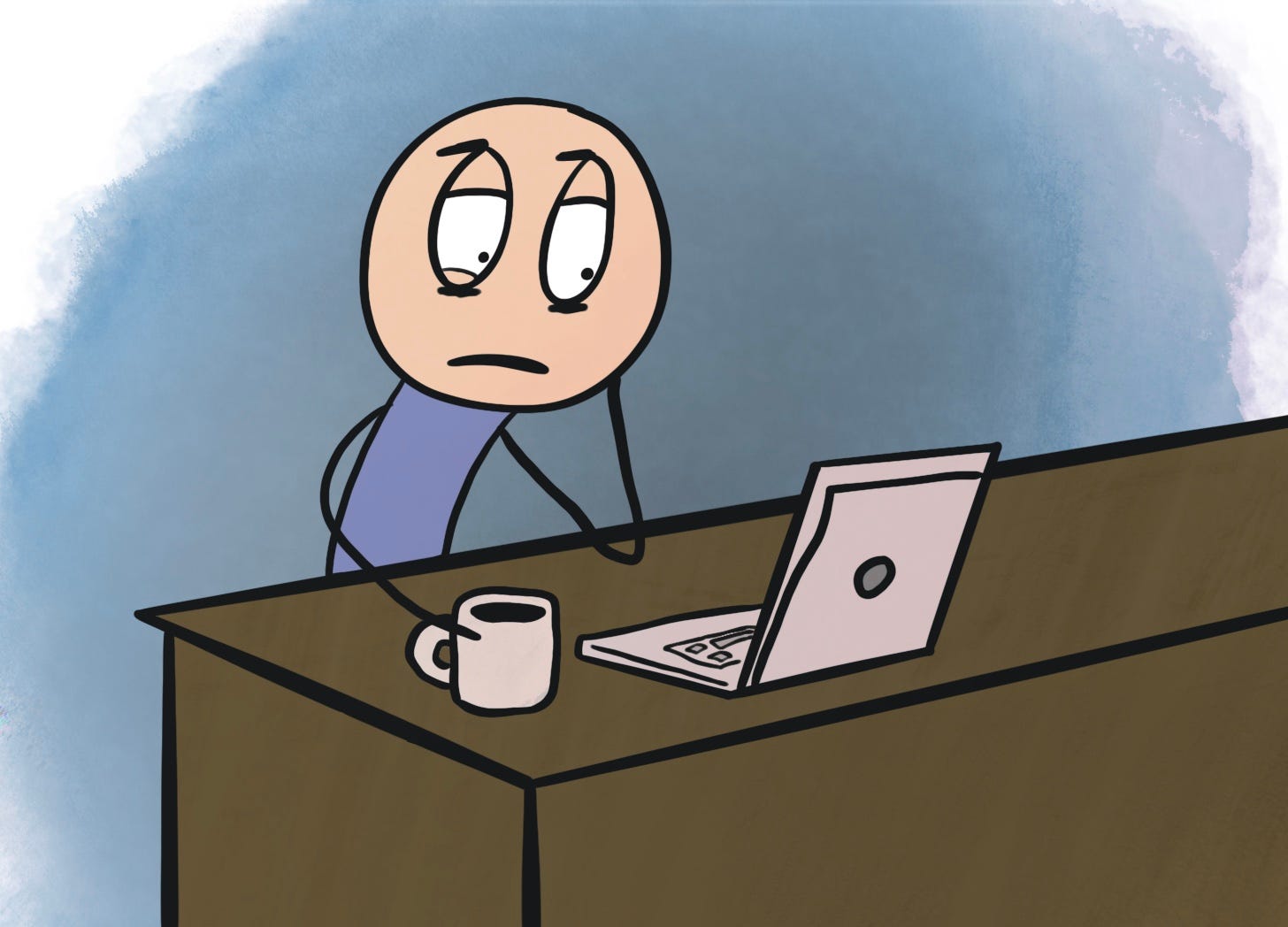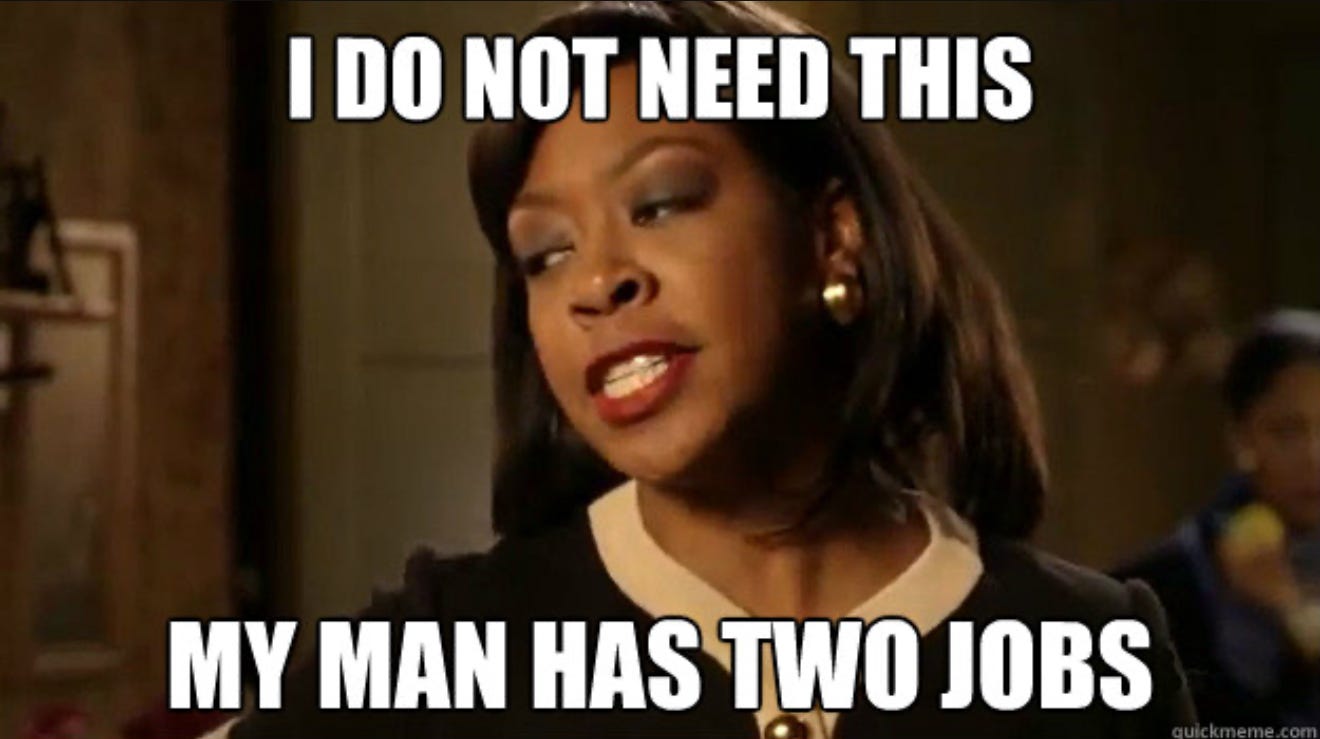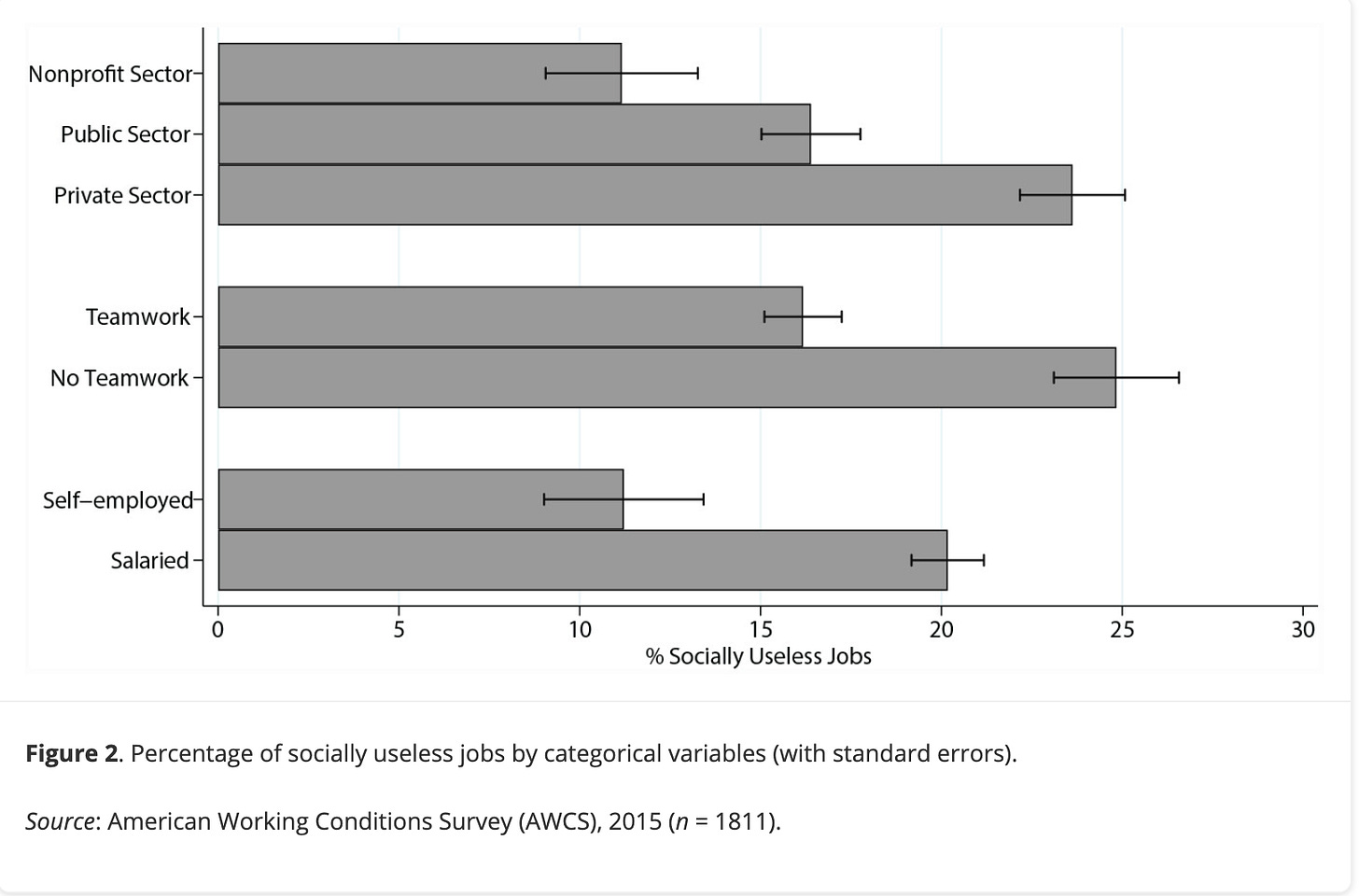The Bullshit Economy
Why 33 Million Americans Are Paid to Pretend They’re Working
Hi, I’m an existential imbecile named Max Murphy. Here on The Murphy Memos we explore the absurdity of existence with crappy cartoons.
Consider subscribing if you’re into that kinda thing.. or don’t!
My right eye twitched after staring at the numbers for so long, trying to rationalize an explanation—any explanation. I couldn’t believe what I was seeing.
It was 5 PM.
I closed the laptop in my home office, but I didn’t get up. Hours limped along like a dog that had been hit by a car. I stared at the wall, unable to think, move, cry, scream, or process what I had just discovered.
This fancy “Email Marketing Specialist” position—my first big boi job out of college—was actually an email spamming job.
That afternoon, I saw the 300,000 emails we had just sent only had two people actually open the email. Two. Fucking. People.
And the ass-kicker? All past campaigns had similar stats.
fuck me.
It was as if I was a high school student in a play. But instead of performing in front of that meager assortment of family and faculty, it was money itself that showed its support, paying me the best I’d ever made in my life for pretending to be useful.
It just didn’t make sense: after two college degrees and twenty years in the education pipeline, this is the most useful thing the system can find for me to do?
Sadly, yes. And apparently, I’m not the only one.
Welcome to the Bullshit Economy
In 2018, anthropologist David Graeber kinda lit the world on fire with his book, Bullshit Jobs: A Theory. He explored the shockingly common phenomenon where people are compelled to work jobs that serve no actual purpose.
He defined a bullshit job as:
“a form of paid employment that is so completely pointless, unnecessary, or pernicious that even the employee cannot justify its existence even though, as part of the conditions of employment, the employee feels obliged to pretend that this is not the case.”
If that sounds familiar, it’s because it is.
If you’ve ever floated through a calendar week of Slack messages, vague OKRs, and meetings that could’ve been emails—and emails that shouldn’t have existed in the first place—you know the vibe.
Graeber’s book became an international best seller. It resonates. Wherever people discuss it online, you’ll find hundreds of anonymous confessions in the comment sections.
But it begs the question: just how common is this?
Over the years, numerous studies have been done—some estimating bullshit jobs at 50%, others as low as 5%. But notably: none at zero.
In 2023, sociologist Simon Walo published Bullshit After All and confirmed our worst fears: roughly 20% of Americans are trapped in a bullshit job. Some napkin math reveals this comes out to something like 33 million jobs.
what in the actual fuck.
With all the problems, the unmet needs, the violent depravity that characterizes ordinary life for most Americans, 33 million people are playing make believe Slack goblin all day—dancing in the circus of performative productivity.
But numbers don’t capture the full absurdity.
For that, we have the Covid pandemic, which validated a key component of Graeber’s theory:
“The more obviously one's work benefits other people, the less one is likely to be paid for it.”
When society shut down during the pandemic, it was a real mask off moment1 when we had to determine who was “essential.” These essential workers kept the lights on and the pulses beating. Teachers, nurses, delivery drivers, janitors—jobs that actually did something.
If these people stopped going to work, society would literally collapse.
And how did we thank them for their sacrifice?
Well, not with money.
Essential workers are paid about 20% less than average. So, the pandemic validated another pillar Graeber’s hypothesis:
“Shit jobs tend to be blue collar and pay by the hour, whereas bullshit jobs tend to be white collar and salaried. Those who work shit jobs tend to be the object of indignities; they not only work hard but also are held in low esteem for that very reason.”
Essential workers have shit jobs.
Period.
Meanwhile, the rest of us non essential workers—the laptop class—just kept Zooming from the kitchen table.
Remote work turned out to be pretty dope.
No more commute. No more office small talk. No more pretending to look busy.
Remote work exposed the black hole that was in person office work. Turns out we really were LARPING a less funny version of The Office all along. Many of us began doing our entire jobs with just a few hours of work a day, now binge-watching Squid Game as we moved our mouse every few minutes to continue appearing online.
With this newfound time, some workers opted to chill with their families. Others pursued those passion projects they’d been neglecting year after heartbreaking year.
But interestingly enough, some people decided to beat the system at its own game: they got a second job.
Enter: over-employment.
Over-employment: the fine art of juggling two (or more) remote jobs at once.
Two jobs means two paychecks.
In times of economic uncertainty, the gutting of social safety nets, and widespread automation, over-employment became a rational response to an irrational system.
It sounds like satire but the subreddit has nearly half a million members, with some people claiming as many as 7 different jobs!
SEVEN FUCKING PAYCHECKS.
A Fortune article claimed half of remote workers were over-employed. ResumeBuilder reported 80%.2
As you might imagine, there was skepticism.
Is over-employment just an overblown internet fad?
One writer argued, “if an organization’s demands are so lax that workers can easily hold down a second full-time role, that probably says more about the employer than the employee.”
And all I’m saying is…
YES. THIS IS EXACTLY IT.
THESE JOBS ARE BULLSHIT.
If you can double your employment without doubling your labor, your job was never real to begin with.
Wait a minute… isn’t this exactly what the market is supposed to prevent?
The Soviet Union, with its universal employment policy, made unemployment illegal. Social parasitism could lead to criminal charges.
The result?
An economy littered with waste, inefficiency, and structural rot.
Just picture it: 5 layers of bureaucracy to collect your rations in the bread line, and complaining about it got your ass sent to the gulag. That’s precisely the problem with a command economy—the government, simply put, cannot efficiently distribute all the goods & services within a society. It’s just too complicated.
American capitalism, by contrast, fostered the exact opposite tendency: competition through the free market. If companies created pointless jobs, they would lose to companies that didn’t.
Right?
Well, the data tells a more nuanced story:
So, the data confirms that not only are there bullshit jobs in the private sector, but even more rapidly than the government.
This forces us to ask an uncomfortable but necessary question: why?
Why has the free market produced more pointless work than the government? Why aren’t these companies being competed away? Why are there 33 million Americans pretending to work 40+ hours a week?
As Graeber put it, there are two possibilities:
Capitalism isn’t really about competition
What we have now isn’t actually capitalism
You can have your pick, but to me, it really seems that we no longer have capitalism.
Graeber called it managerial feudalism. Yanis Varoufakis called it techno-feudalism. Others call it crony capitalism. Or corporatism.
Wherever you fall on the political spectrum, we should be able to agree on one thing: the economy, as it exists right now, is not really driven by competition. And instead of getting bogged down in abstract words with fleeting definitions, we should be focus on how to actually fix this shit.
Final Thoughts
It’s tempting to end with a silver bullet. A policy fix. A grand vision to kill the beast and save the village.
And yeah—universal basic income has its place. Graeber believed in it. A social safety net thick enough to catch human dignity before it shatters like an egg on the pavement. Hard to argue with that.
But let’s not pretend something that forward thinking can happen so quickly.
Because underneath the performative nonsense and the Zoom fatigue, what we’re really starving for is meaningful work. The chance to do something real with the short time we have.
This is where Self-Determination Theory (SDT) comes in.
Developed by psychologists Edward Deci and Richard Ryan, STD3 says we thrive when three core needs are met:
Autonomy: the freedom to choose how we work
Competence: the ability to get better at something that matters
Relatedness: the sense of belonging to a shared purpose or community
That’s it. No cryptocurrency. No lean startup cults. No corporate vision statements that sound like they were spit out by a bot that ate too many TED Talks.
Just three basic but timeless needs.
And almost no one’s job meets them today.
Imagine a work culture that didn’t punish curiosity. That rewarded craft. That let people unplug without guilt. That asked “What are you good at?” instead of “What can we extract from you today?”
This is literally basic psychology.
If we want to fix work—this is where we start. With the question every bullshit job suppresses:
What would you do if you didn’t have to pretend?
ps: if you liked this essay, you’ll love this one too:
Don’t lie, this is the best pun you’ve read all month. Please subscribe
Being over-employed carries great risk of being exposed and fired, so anonymous surveys are the best stats we’ll ever get.
Yes, this was a typo. No, I’m not fixing it.







Max, I love your style. Excellent read.
Great essay and plenty of food for thought. I will witness to holding some bullshit jobs myself. They are, in effect, a jobs creation program for the PMC.